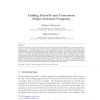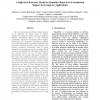2093 search results - page 106 / 419 » Developing Federation Object Models Using Ontologies |
105
Voted
ECCV
2004
Springer
16 years 4 months ago
2004
Springer
We propose a multiple classifier system approach to object recognition in computer vision. The aim of the approach is to use multiple experts successively to prune the list of cand...
131
click to vote
ENTCS
2008
15 years 2 months ago
2008
The Event-B method is a formal approach to modelling systems, using refinement. Initial specification is a high level of abstraction; detail is added in refinement steps as the de...
114
Voted
PDP
2007
IEEE
15 years 8 months ago
2007
IEEE
The success of groupware software largely depends on its capability for being reused in different collaborative scenarios without requiring significant software development effort...
127
Voted
TSE
2002
15 years 1 months ago
2002
A number of papers have investigated the relationships between design metrics and the detection of faults in object-oriented software. Several of these studies have shown that suc...
116
click to vote
ANSS
2002
IEEE
15 years 7 months ago
2002
IEEE
Modelica is a general equation-based object-oriented language for continuous and discrete-event modeling of physical systems for the purpose of efficient simulation. The language ...



